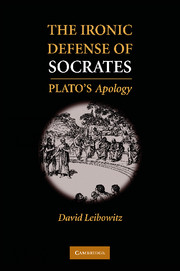Book contents
- Frontmatter
- Contents
- Acknowledgments
- Introduction
- 1 Title and Preliminary Considerations
- 2 Prooemium (17a1–18a6)
- 3 Prothesis (18a7–19a7)
- 4 Defense against the Charges of the First Accusers (19a8–24b2)
- 5 Defense against the Present Accusers (24b3–28b2)
- 6 Second Digression (28b3–34b5)
- 7 Epilogue (34b6–35d8)
- 8 Penalty Section (35e1–38b9)
- 9 Final Speech (38c1–42a5)
- 10 Conclusion
- Short Titles
- Bibliography
- Index
4 - Defense against the Charges of the First Accusers (19a8–24b2)
Published online by Cambridge University Press: 05 August 2011
- Frontmatter
- Contents
- Acknowledgments
- Introduction
- 1 Title and Preliminary Considerations
- 2 Prooemium (17a1–18a6)
- 3 Prothesis (18a7–19a7)
- 4 Defense against the Charges of the First Accusers (19a8–24b2)
- 5 Defense against the Present Accusers (24b3–28b2)
- 6 Second Digression (28b3–34b5)
- 7 Epilogue (34b6–35d8)
- 8 Penalty Section (35e1–38b9)
- 9 Final Speech (38c1–42a5)
- 10 Conclusion
- Short Titles
- Bibliography
- Index
Summary
Refutation of Their Charges (19a8–20c3)
Restatement of the Charges
Before replying to the charges of the first accusers, Socrates explains their relation to the present charges and restates them “as though” they were truly an accusation (19b3). In bringing the present indictment, Socrates now says, Meletus “trusted in” the charges of the first accusers. This comes as a surprise, because up to this point Socrates has insisted that his accusers fall into two distinct groups with two distinct sets of charges (18a7–b1, 19d7–e1). It now appears, however, that the first accusation lays the foundation for the present one. The significance of this change will become clear only later when the distinction between the two sets of accusers has been blurred still further.
Socrates now “repeats” the charges of the first accusers in the form of an indictment: “Socrates does injustice and is a busybody, by investigating the things under the earth and the heavenly things, and by making the weaker speech the stronger, and by teaching others these same things” (19b4–c1). As usual, Socrates alters his original statement as he repeats it, a fact he quietly acknowledges in this case by saying that he will start “from the beginning,” meaning that he will not proceed on the basis of what came before (19a8). The repetition differs from the original in point of view. The original statement presents Socrates as a wise man: it is at least conceivable that the speakers admire Socrates.
- Type
- Chapter
- Information
- The Ironic Defense of SocratesPlato's Apology, pp. 49 - 115Publisher: Cambridge University PressPrint publication year: 2010



